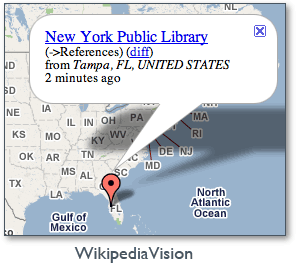File this post under: “Intriguing ourselves to Death”
 Check the cool new mashup of Google Maps, Wikipedia and László Kozma’s programming that he calls WikipediaVision. It’s a great illustration of the changing nature of “knowledge.” WikipediaVision provides relatively realtime markers for who just added content to Wikipedia from where and on what topic. Like the search voyeur sites, it’s easy to get caught in the experience. I paused a little while to capture what I thought was an interesting juxtaposition. Here we have someone from Florida adding content to the entry on one of the grand old repositories of knowledge.
Check the cool new mashup of Google Maps, Wikipedia and László Kozma’s programming that he calls WikipediaVision. It’s a great illustration of the changing nature of “knowledge.” WikipediaVision provides relatively realtime markers for who just added content to Wikipedia from where and on what topic. Like the search voyeur sites, it’s easy to get caught in the experience. I paused a little while to capture what I thought was an interesting juxtaposition. Here we have someone from Florida adding content to the entry on one of the grand old repositories of knowledge.
Like the last post, I suspect that’s what’s most needed for educational change to not descend into oxymoronic cliche is to re-envision school as a place that fosters the joy of learning that WikpediaVision and most Web 2 apps amply illustrate is alive and well.
Also take a look at flickrvision, the site that inspired Kozma’s WikipediaVision.

 A daily sampling of unique images from
A daily sampling of unique images from  In its article
In its article